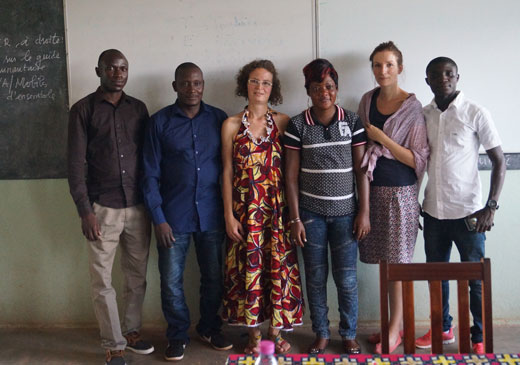Kick-off workshop in Bangui for the research project ‘Being Young in Times of Duress in the Central African Republic’
 From 15 to 18 August ASCL researchers Mirjam de Bruijn, Catherina Wilson and Jonna Both were in Bangui (Central African Republic) for a workshop that marked the beginning of the research collaboration between the ASCL and the Anthropology Department at the University of Bangui. The independent research project Being young in Times of Duress in the Central African Republic is funded by the Nationale Postcode Loterij through UNICEF Netherlands and seeks to generate insight into the (historical) connection between youth, the experience of violence and armed conflict in the Central African Republic. The aim of this study is to inform UNICEF in the Central African Republic and its partner organizations on the perspectives of young people on their conflict-related experiences and also on their experiences with NGO reintegration programmes after the various episodes of armed conflict that the country has known over the last decades.
From 15 to 18 August ASCL researchers Mirjam de Bruijn, Catherina Wilson and Jonna Both were in Bangui (Central African Republic) for a workshop that marked the beginning of the research collaboration between the ASCL and the Anthropology Department at the University of Bangui. The independent research project Being young in Times of Duress in the Central African Republic is funded by the Nationale Postcode Loterij through UNICEF Netherlands and seeks to generate insight into the (historical) connection between youth, the experience of violence and armed conflict in the Central African Republic. The aim of this study is to inform UNICEF in the Central African Republic and its partner organizations on the perspectives of young people on their conflict-related experiences and also on their experiences with NGO reintegration programmes after the various episodes of armed conflict that the country has known over the last decades.Official collaboration
Contacts with the Department of Anthropology of the University of Bangui had been established earlier by Mirjam de Bruijn and PhD students conducting research in the Central African Republic in 2012 and 2013 within the context of the Connecting in Times of Duress research project. After the latest episode of violent conflict in CAR made the country practically inaccessible for the researchers, we were glad to return to the country in 2016 with a concrete project that would enable official collaboration between the two institutions and offer new opportunities for exchange and inspiration on both sides.
Impact of reintegration programmes
During the workshop we made acquaintance with two students and a junior researcher that will work with us on the project together with the head of the Department of Anthropology, Dr Ngouflo. An important aim of the workshop was to rethink together the research proposal developed by the ASCL team and adapt it where necessary. The initial proposal was predominantly oriented towards tracing earlier cohorts of children formerly associated by armed forces or armed groups. The aim was to understand their reflections on reintegration programmes set up by non-governmental organizations (NGOs) that they did or did not take part in in the past. With this more long-term perspective on re-integration programmes we aimed for direct input for these organizations that come in and roll out similar programs after each period of intensified armed conflict in the country. We wanted to offer a more ‘historical perspective’ to organizations that mostly act upon the latest emergency but hardly have time to study the long-term impact of all their programmes.
Role of violence in young people’s lives
As a team we discussed the need to broaden the study. While a long-term reflection on the impact of (previous) reintegration programmes still forms part of the research questions, we felt the need to question more generally the notion of childhood and youth in the Central African Republic and the role of violence in young people’s lives. Such an approach, that questions the potential normality or at least the routinization of violence in their lives, helps us to ask critical questions about what ‘reintegration’ as NGOs envisage it, might actually entail in such a context. At the same time it allows us to follow up on various generations and their experiences as children and youth and therewith contribute to a more historical and cultural understanding of young people’s experiences of violence and participation in armed groups in the Central African Republic.
Biographical narratives
The main methods we explored for this research are biographical narratives and observation supplemented by the search for personal archives and archival research. Our research methodology is inspired by the methodology used by the Voice4Thought project and aims for alternative publications on their website to reach a larger public. A documentary will be made towards the end of the project as well. During the first 3,5 workshop days we explored the theoretical framework ethics and methodology for the study. After that, the research plan was presented at the UNICEF Bangui headquarters where the research plans were supported and the need for more in-depth information concerning the experiences of children and youth in the country was confirmed.
Security high on the agenda
Since we left Bangui on 19 August, violent incidents happened in various corners of the Central African Republic. Nevertheless, the researchers from the University of Bangui have left the capital for their various research locations late September, determined to profit from what is considered a relative calm in the country at present. There is no doubt that security concerns remain high on our agenda throughout this research and that these concerns will require the whole team to be creative in adapting the research plans where personal safety or the safety of our research participants is at stake. Soon we will launch a project page on the Voice4Thought website to inform the public of our first findings and follow-up activities.
For further information please contact Jonna Both: j.c.both@hum.leidenuniv.nl
Posted on 7 October 2016, last modified on 7 October 2016

